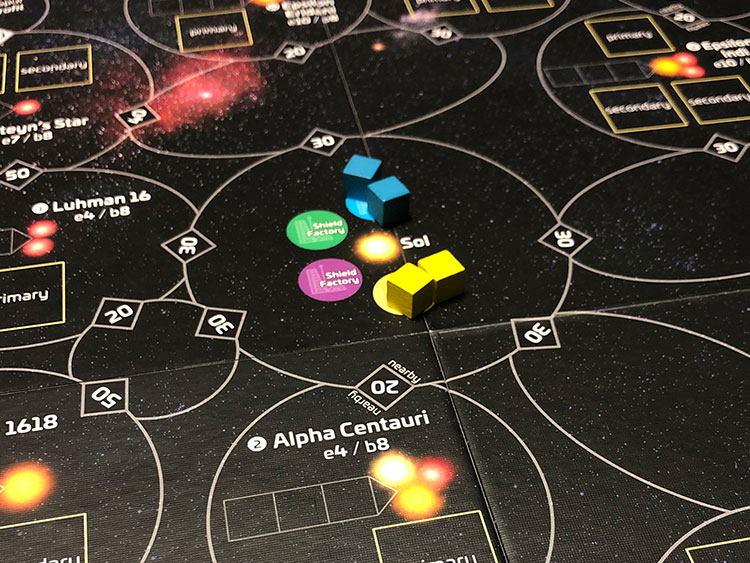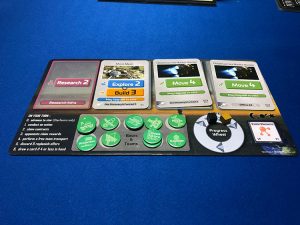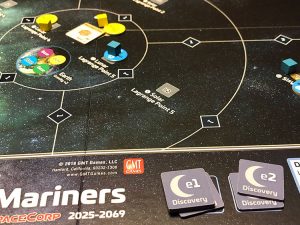 “Here. Review this,” said Tony. He casually tossed SpaceCorp 2025-2300 AD at me from his…NASA flight rated space suit?
“Here. Review this,” said Tony. He casually tossed SpaceCorp 2025-2300 AD at me from his…NASA flight rated space suit?
“Ummmm,” I started, trailing off.
“I am out of here. This planet is running out of resources. Also, that game has taught me all I need to know about space travel.”
I literally had no reply.
“Tell Andrew he can take over BGQ. I’d let you, but you gave Marvel Dice Masters 4 stars.”
With that, he sealed his helmet and walked away.
Gameplay Overview:
SpaceCorp 2025 – 2300 AD (SpaceCorp going forward) is a board game about space travel and exploration during three different eras. It is also based on a book, appropriately titled SpaceCorp, that I have not read.
The game is played over a variable number of turns. A turn is made up of six phases (seven in the third era) as follows:
- Advance on the star track (third era only)
- Conduct one action – the player can choose from one of eight actions (nine in the second era, ten in the third era), that will allow them to move, research, and explore, among other options.
- Fulfill contracts – if the criteria for completing a contract are met by a player (first base on Mars, for example), they can claim a contract.
- Rewards – if a player uses an opponent’s base or Infra, that opponent may draw a card as a reward.
- Transport Team – a player can move one of their teams for free under certain circumstances.
- Discard and replenish the Offer – players discard all cards played and replenish any cards taken for the four Offer slots.
- Draw a card from the action card deck if a player as four or fewer cards in their hand.
The era ends when either six of the seven contracts are fulfilled or the action card deck runs out and a player either voluntarily passes or cannot perform an action. The player with the most cumulative points (profit) after three eras is the Best Space Explorer Evah (and the winner!)

Game Experience:
I wanted to love this game. I LOVED the premise. An easy to play card game spread across three different eras, represented by three different game boards, with each game board having a slightly more complicated ruleset than the previous one. When you finish the first era, Mariners (2025-2069), you start the second era, Planeteers (2070-2149), where the first era left off, with the same transition happening for the third era, Starfarers (2150-2300, also NOT from Catan). You can also take one Legacy Production, if built, from the previous era into the next era. Finally, you can earn a starting bonus if certain criteria were met in the previous era.

The card play is simple, but also what I enjoyed the most. You can play multiple cards with the same action type from your hand to increase that action’s effectiveness, such as moving one of your teams. To perform the move action, you will need to calculate the move value to cover the distance from one site to another, as well as the potential impact of gravity, taking off and landing. It is not complicated and, after moving a couple of times, it becomes second nature.
The required value for exploring (leading to valuable discoveries), building (establishing bases that provide different bonuses), or producing (generate points) is MUCH simpler—simply look at the value in the space and equal or exceed it with your cards. But what should you do if you cannot play enough cards to perform the action?
Infra is the answer! Infra, short for infrastructure, can be used to boost the action. You can use either your or an opponent’s Infra to accomplish this. (Note: your opponent gets a free card as a reward if you do). Each player has a player board with four slots for Infra. Players can use the upgrade action to play a card to one of the slots for that turn as long as that card indicates it may be used as Infra. If one slot has move 1 and another has move 3, you would have a permanent boost of move 4 and, yes, Infras carries over across eras. Building Infra leads to potentially large boosts, but at the cost of actually moving, exploring, or building bases on the board. I enjoyed balancing building Infra vs. taking actions on the board due to the limited board spaces, especially as the player count increased.

Of the three eras, the Planeteers era was my favorite. Mariners is a pure race and, after a couple of plays, can easily be completed in less than an hour. Planeteers expand the number of available sites, but also added new mechanics that I liked, such as a sideboard for bonus cards, shielding your teams from radiation, and sacrificing points instead of using Infra. The decision space is expanded in Planeteers, yet there is still competition for sites. Again, higher player counts increase the competition.
So, I said I wanted to love this game; unfortunately, I did not. There are two significant issues I had with the game.
The first is the star systems in Starfarers. In the Mariner and Planeteer eras, each site can be contested. One player can explore a site and another player can swoop in and build a base. In Starfarers, when you get to a star system, your team is put on a three space star track. At the start of each player’s turn, their teams that are on star tracks move one space. Once a team moves off the last space, it is placed on the star. That player can then explore that star system and ALL of the sites are explored for that system. Compounding my dislike for this change is that it is very difficult to pass someone up on the track. This leads to no one competing for sites because, in most cases, you would be better off exploring and building at your star system

The second is with the start cards. All three eras have two types of cards – start cards (there are 12 of them) and regular cards. The issue is that start cards are objectively worse than regular cards. I experienced several games where players would Research and draw blindly rather than take a start card from the offer. Why take a weaker card from the offer when it will be filled with a regular card, allowing your opponents to see a face up regular card. We had several games where all four or three of the offer cards remained start cards for the entire game.
Final Thoughts:
SpaceCorp is a decent game with, in my opinion, a couple of glaring issues. I would recommend people try the game before they buy it. After playing SpaceCorp several times, I felt unsatisfied, like an opportunity for a grander game was missed.
Final Score: 2.5 Stars – A game that had some great potential, but ultimately left me wanting something better.
 Hits:
Hits:
• Amazing premise in scope, especially with the three boards.
• Card play and planning actions are enjoyable.
Misses:
• Starfarers is a disappointment when compared to Mariners and Planeteers.
• Start card balance issues distracted from the offer.
• The execution of the premise, especially with the carryover rewards from era to era, was underwhelming.






















Thanks for the review. I’m leaving a comment only because, while I understand — though don’t totally agree with the assessment — your two specific complaints, I would still rate the game much higher, certainly 4+.
What engrosses me with this game is the way that a winning strategy must evolve based on what has taken place so far, and what is likely — though not necessarily — to follow. It is also a game that rewards persistence in the face of seeming hopelessness. There are many strategic game elements to consider and one is constantly making trade-offs with every decision. Also, one can recover from lousy results of the chance elements in the game by re-jigging strategy. Constantly.
It is possible to recover, late in the game and in multiple ways, from a dismal position where the leader is far ahead. So, leaders must be watching their backs.
I’m often a whiner and poor sport in dice-powered games; I really dislike losing from bad dice luck. (e.g. Avalon Hill’s Titan) This game has no dice and I feel that, ultimately, whether I do well or not is based much more on how well I am able to navigate events and make wise choices.
Losing has never been so acceptable. 😊